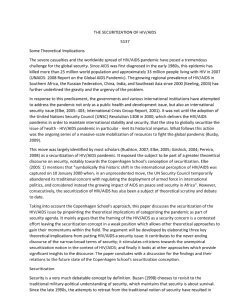THE SECURITIZATION OF HIV/AIDS The severe casualties and the worldwide spread of HIV/AIDS pandemic have posed a tremendous challenge for the global security. Since AIDS was first diagnosed in the 5137
THE SECURITIZATION OF HIV/AIDS The severe casualties and the worldwide spread of HIV/AIDS pandemic have posed a tremendous challenge for the global security. Since AIDS was first diagnosed in the 5137
THE SECURITIZATION OF HIV/AIDS
5137
Some Theoretical Implications
The severe casualties and the worldwide spread of HIV/AIDS pandemic have posed a tremendous challenge for the global security. Since AIDS was first diagnosed in the early 1980s, this epidemic has killed more than 25 million world population and approximately 33 million people living with HIV in 2007 (UNAIDS: 2008 Report on the Global AIDS Pandemic). The growing regional prevalence of HIV/AIDS in Southern Africa, the Russian Federation, China, India, and Southeast Asia since 2000 (Keeling, 2003) has further underlined the gravity and the urgency of the problem.
In response to this predicament, the governments and various international institutions have attempted to address the pandemic not only as a public health and development issue, but also an international security issue (Elbe, 2005: 403; International Crisis Group Report, 2001). It was not until the adoption of the United Nations Security Council (UNSC) Resolution 1308 in 2000, which delivers the HIV/AIDS pandemic in order to maintain international stability and security, that the step to globally securitize the issue of health - HIV/AIDS pandemic in particular - met its historical impetus. What follows this action was the ongoing series of a massive-scale mobilization of resources to fight the global pandemic (Busby, 2009).
This move was largely identified by most scholars (Rushton, 2007; Elbe, 2005; Girshick, 2004; Pereira, 2008) as a securitization of HIV/AIDS pandemic. It exposed the subject to be part of a greater theoretical discourse on security, notably towards the Copenhagen School's conception of securitization. Elbe (2005: 1) mentions that "symbolically this historic shift in the international perception of HIV/AIDS was captured on 10 January 2000 when, in an unprecedented move, the UN Security Council temporarily abandoned its traditional concern with regulating the deployment of armed force in international politics, and considered instead the growing impact of AIDS on peace and security in Africa". However, consecutively, the securitization of HIV/AIDS has also been a subject of theoretical scrutiny and debate to date.
Taking into account the Copenhagen School's approach, this paper discusses the securitization of the HIV/AIDS issue by pinpointing the theoretical implications of categorizing the pandemic as part of security agenda. It mainly argues that the framing of the HIV/AIDS as a security concern is a contested
